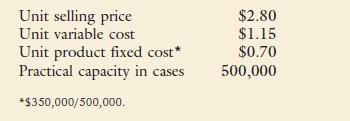VSOP, Inc., has a number of divisions that produce liquors, malt beverages, and glassware. The Glassware Division
Question:
VSOP, Inc., has a number of divisions that produce liquors, malt beverages, and glassware.
The Glassware Division manufactures a variety of bottles which can be sold externally
(to soft-drink and juice bottlers) or internally to VSOP’s Malt Beverage Division.
Sales and cost data on a case of 24 basic 12-ounce bottles are as follows:

During the coming year, the Glassware Division expects to sell 390,000 cases of this bottle. The Malt Beverage Division currently plans to buy 100,000 cases on the outside market for \($2.80\) each. Jill Von Holstein, manager of the Glassware Division, approached Eric Alman, manager of the Malt Beverage Division, and offered to sell the 100,000 cases for \($2.75\) each. Jill explained to Eric that she can avoid selling costs of \($0.10\) per case by selling internally and that she would split the savings by offering a \($0.05\) discount on the usual price.
Required:
1. What is the minimum transfer price that the Glassware Division would be willing to accept? What is the maximum transfer price that the Malt Beverage Division would be willing to pay? Should an internal transfer take place? What would be the benefit (or loss) to the firm as a whole if the internal transfer takes place?
2. Suppose Eric knows that the Glassware Division has idle capacity. Do you think that he would agree to the transfer price of $2.75? Suppose he counters with an offer to pay \($2.40\). If you were Jill, would you be interested in this price? Explain with supporting computations.
3. Suppose that VSOP’s policy is that all internal transfers take place at full manufacturing cost. What would the transfer price be? Would the transfer take place?
Step by Step Answer:

Cost Management Accounting And Control
ISBN: 9780324233100
5th Edition
Authors: Don R. Hansen, Maryanne M. Mowen





